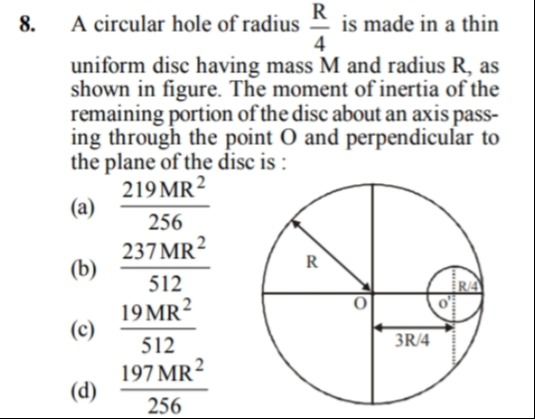Question
Question: A circular hole of radius $\frac{R}{4}$ is made in a thin uniform disc having mass M and radius R, a...
A circular hole of radius 4R is made in a thin uniform disc having mass M and radius R, as shown in figure. The moment of inertia of the remaining portion of the disc about an axis passing through the point O and perpendicular to the plane of the disc is :

256219MR2
512237MR2
51219MR2
256197MR2
512237MR2
Solution
The moment of inertia of the original uniform disc of mass M and radius R about an axis passing through its center O and perpendicular to its plane is Ioriginal=21MR2. The disc has a uniform surface mass density σ=πR2M. A circular hole of radius r=4R is made. The mass of the removed portion (hole) is mhole=σ×(πr2)=πR2M×π(4R)2=16M. The center of the hole, O', is located at a distance d=43R from the center O of the original disc. The moment of inertia of the hole about its own center O' is Ihole,O′=21mholer2=21(16M)(4R)2=512MR2. Using the parallel axis theorem, the moment of inertia of the hole about the axis passing through O is Ihole,O=Ihole,O′+mholed2=512MR2+(16M)(43R)2=512MR2+2569MR2=51219MR2. The moment of inertia of the remaining portion of the disc is Iremaining=Ioriginal−Ihole,O=21MR2−51219MR2=512256MR2−51219MR2=512237MR2.
